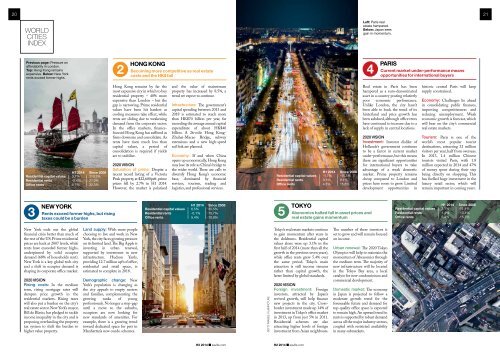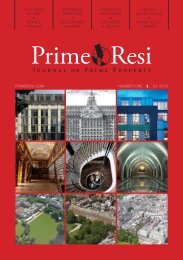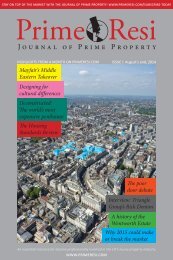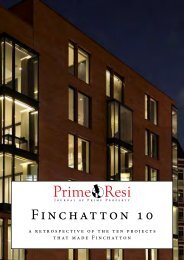Savills 12 Cities Report
Live/Work Index
Live/Work Index
Create successful ePaper yourself
Turn your PDF publications into a flip-book with our unique Google optimized e-Paper software.
20<br />
21<br />
World<br />
cities<br />
index<br />
Left: Paris real<br />
estate hampered.<br />
Below: Japan sees<br />
gain in momentum.<br />
Previous page: Pressure on<br />
affordability in London.<br />
Top: Hong Kong remains<br />
expensive. Below: New York<br />
rents exceed former highs.<br />
2<br />
Hong Kong<br />
Becoming more competitive as real estate<br />
costs and the HK$ fall<br />
4<br />
Paris<br />
Current market under-performance means<br />
opportunities for international buyers<br />
Top: Paris real estate<br />
H1<br />
hampered.<br />
2014 Since<br />
Above:<br />
2008<br />
Residential capital values 3.7%<br />
Japan sees<br />
113.3%<br />
gain in<br />
Residential rents -2.4% momentum. 21.0%<br />
Office rents 0.7% 32.3%<br />
Hong Kong remains by far the<br />
most expensive city in which to buy<br />
residential property – 40% more<br />
expensive than London – but the<br />
gap is narrowing. Prime residential<br />
values have been hit hardest as<br />
cooling measures take effect, while<br />
rents are sliding due to weakening<br />
demand from the corporate sector.<br />
In the office markets, financefocused<br />
Hong Kong has suffered as<br />
firms downsize and consolidate. As<br />
rents have risen much less than<br />
capital values, a period of<br />
consolidation is required if yields<br />
are to stabilise.<br />
2020 vision<br />
Saturation of prime: Despite a<br />
recent record listing of a Victoria<br />
Peak property, at $22,600psft, prime<br />
prices fell by 2.7% in H1 2014.<br />
However, the market is polarised<br />
and the value of mainstream<br />
property has increased by 8.5%, a<br />
trend we expect to continue.<br />
Infrastructure: The government’s<br />
capital spending between 2013 and<br />
2018 is estimated to reach more<br />
than HK$70 billion per year, far<br />
exceeding the average annual capital<br />
expenditure of about HK$40<br />
billion. A 26-mile Hong Kong-<br />
Zhuhai-Macao Bridge, subway<br />
extensions and a new high-speed<br />
rail link are planned.<br />
Economy: If and when China<br />
opens up economically, Hong Kong<br />
may lose its role as China’s bridge to<br />
the wider world. There are calls to<br />
diversify Hong Kong’s economic<br />
base, dominated by financial<br />
services, tourism, trading and<br />
logistics, and professional services.<br />
H1 2014 Since 2008<br />
Residential capital values -1.7% -15.5%<br />
Residential rents 0.1% 9.1%<br />
Office rents 4.3% 15.6%<br />
Real estate in Paris has been<br />
hampered as a euro-denominated<br />
asset in a country posting relatively<br />
poor economic performance.<br />
Unlike London, the city hasn’t<br />
been able to buck the trend of its<br />
hinterland and price growth has<br />
been subdued, although office rents<br />
have continued to increase due to a<br />
lack of supply in central locations.<br />
2020 vision<br />
Investment: Investor dislike of<br />
Hollande’s government continues<br />
to be a factor in current market<br />
under-performance, but this means<br />
there are significant opportunities<br />
for international buyers to take<br />
advantage of a weak domestic<br />
market. Prime property remains<br />
cheap compared to London and<br />
prices have room to grow. Limited<br />
development opportunities in<br />
historic central Paris will keep<br />
supply constrained.<br />
Economy: Challenges lie ahead<br />
in consolidating public finances,<br />
improving competitiveness and<br />
reducing unemployment. Weak<br />
economic growth is forecast, which<br />
will bear on the city’s commercial<br />
real estate markets.<br />
Tourism: Paris is one of the<br />
world’s most popular tourist<br />
destinations, attracting 32 million<br />
visitors per year, half from overseas.<br />
In 2013, 1.4 million Chinese<br />
tourists visited Paris, with 1.8<br />
million expected in 2014 and 47%<br />
of money spent during their stay<br />
being directly on shopping. This<br />
has fuelled huge investment in the<br />
luxury retail sector, which will<br />
remain important in coming years.<br />
3<br />
new york<br />
Rents exceed former highs, but rising<br />
taxes could be a burden<br />
Top: Paris real estate<br />
H1<br />
hampered.<br />
2014 Since<br />
Above:<br />
2008<br />
Residential capital values 6.5%<br />
Japan sees<br />
35.5%<br />
gain in<br />
Residential rents -0.1% momentum. 15.7%<br />
Office rents 5.4% 10.9%<br />
5<br />
tokyo<br />
Abenomics halted fall in asset prices and<br />
real estate gains momentum<br />
H1 2014 Since 2008<br />
Residential capital values 3.1% -11.4%<br />
Residential rents 1.4% -13.4%<br />
Office rents 5.4% -15.7%<br />
New York rode out the global<br />
financial crisis better than much of<br />
the rest of the US. Prime residential<br />
prices are back at 2007 levels, while<br />
rents have exceeded former highs,<br />
underpinned by solid occupier<br />
demand (68% of households rent).<br />
New York is a key global tech city<br />
and a shift in occupier demand is<br />
shaping its corporate office market.<br />
2020 vision<br />
Rising costs: In the medium<br />
term, rising mortgage rates will<br />
dampen price growth in the<br />
residential markets. Rising taxes<br />
will also put a burden on the city’s<br />
real estate sector. New York’s mayor,<br />
Bill de Blasio, has pledged to tackle<br />
income inequality in the city and is<br />
proposing overhauling the property<br />
tax system to shift the burden to<br />
higher value property.<br />
Land supply: With more people<br />
choosing to live and work in New<br />
York, the city faces growing pressure<br />
on its limited land. The Big Apple is<br />
investing in urban renewal,<br />
supported by investment in new<br />
infrastructure. Hudson Yards,<br />
providing <strong>12</strong>.7 million sqft of office,<br />
residential and retail space, is<br />
estimated to complete in 2018.<br />
Demographic change: New<br />
York’s population is changing as<br />
the city appeals to empty nesters<br />
and families, complementing the<br />
growing ranks of young<br />
professionals. No longer a stop-gap<br />
until a move to the suburbs,<br />
occupiers are now looking for<br />
new standards of amenities. For<br />
example, there is a growing trend<br />
toward dedicated space for pets in<br />
Manhattan’s new condo schemes.<br />
getty images, plainpicture<br />
Tokyo’s real estate markets continue<br />
to gain momentum after years in<br />
the doldrums. Residential capital<br />
values alone were up 3.1% in the<br />
first half of 2014 (more than all the<br />
growth in the previous seven years),<br />
while office rents grew 5.4% over<br />
the same period. Tokyo’s main<br />
attraction is still income streams<br />
rather than capital growth, the<br />
latter limited by global standards.<br />
2020 vision<br />
Foreign investment: Foreign<br />
investors, attracted by Japan’s<br />
revived growth, will help finance<br />
new projects in the city. Crossborder<br />
investment made up 14% of<br />
investment in Tokyo’s office market<br />
in 2013, up from just 5% in 2011.<br />
Residential schemes are also<br />
attracting higher levels of foreign<br />
investment from Asian neighbours.<br />
The number of these investors is<br />
set to grow and will remain focused<br />
on income.<br />
Urban renewal: The 2020 Tokyo<br />
Olympics will help to maintain the<br />
momentum of Abenomics through<br />
the medium term. The majority of<br />
new infrastructure will be located<br />
in the Tokyo Bay area, a local<br />
catalyst for new condominium and<br />
commercial development.<br />
Domestic market: The economy<br />
in Japan is projected to follow a<br />
moderate growth trend for the<br />
foreseeable future and demand for<br />
top-quality office space is expected<br />
to remain high. An upward trend in<br />
rents is supported by robust demand<br />
across all the major industry sectors,<br />
coupled with restricted availability<br />
in many submarkets.<br />
H2 2014<br />
savills.com<br />
H2 2014<br />
savills.com







